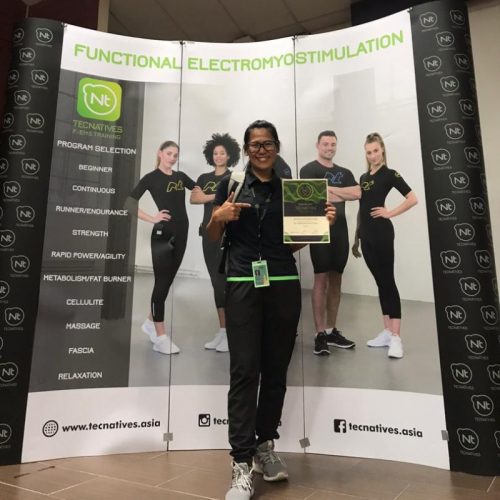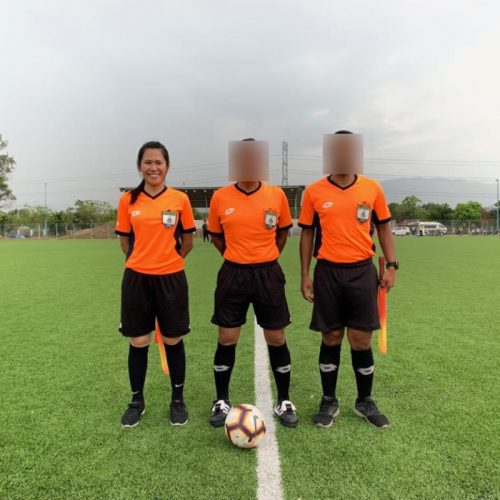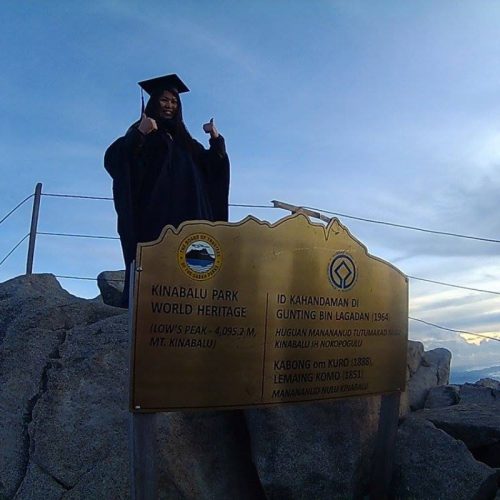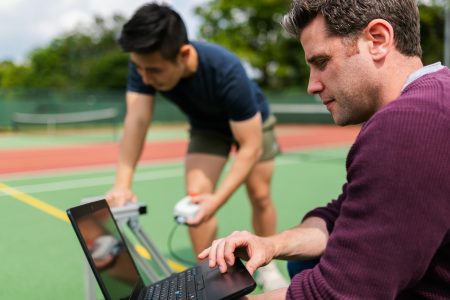Sport Science is a branch of science that studies the human body response to physical activities, including the study of anatomy, physiology, kinesiology, biomechanics, psychology, management et cetera. Today we are fortunate to be able to interview a Sport Science graduate, Miss Phylicia Phoa, regarding her experience on career and education in Sport Science.
Phylicia, 27 year-old Sarawakian is a graduate of Bachelors of Science with Honours in Sport Science (2016, UMS) and Masters in Science in Sport Science (2020, UMS). She is currently pursuing her PhD in Sport Science.

Q: Why did you choose Sport Science?
A: I was active in various sports since secondary school, but knowing that Sport Science is more than just study of sports, I realise that this field has a high potential to grow and contribute to our country’s economic growth.
Q:What are the career opportunities available in Sport Science?
A: Some examples of career opportunities include physical education teachers, coach, sports rehabilitation therapist, physiotherapist, sport psychologist, sport researcher, personal trainer, lecturer, sports massage therapist, and many more.
Q: What are the requirements to apply for this course?
Q: For Universiti Malaysia Sabah (UMS), intake is open to STPM leavers, Matriculation or similar qualification, and meet the general requirement of the university. Other requirements are scoring credits in SPM for the subjects Science/Sport Science/Mathematics, and pass the entrance exam and interview. Criteria for other universities may differ, so I would suggest to visit their websites for more information.
Q: Can you please share us your experience with the entrance exam and interview? Any tips and advices?
A: Of course! If you meet all the requirements, you will be called for an entrance exam in the form of physical and fitness exam, and an interview session. I advise you to be at your best stamina and physical condition before taking the test. Example of fitness test include Beep test and various exercises. As for interview, make sure you are well-versed with the current issues and development regarding sports and good understanding on the prospect of sport science. Like every other interviews, make sure you be on your best attitude. Wear proper attire, for example sports attire and shoes during the fitness exam, and formal wear during the interview.

Q; What did you learn in this program? Any favourite subjects? How are the students being assessed every semester?
A: For Bachelors of Science with Honours in Sport Science, you get to choose one major during your third semester (year 2 of study), which are Sports Management and Coaching. I chose to major in Sports Management. Examples of courses are
- Sports Prescription
- Sports and Recreation
- Sports Organisation Management and Human Resources
- Risk Management and Sports Law
- Sports Psychology
- Sports and Tourism
- Sports Biomechanics
- Nutrition
- Sports and Media
- Talent Identification and Development, and many more.
From these examples you can see that the courses learned in sport science do not only focus on sports and “playing” all the time, as some of you might think. However, the program teaches scientific and managerial skills that requires analytic and critical thinking to improve the quality of a sport team, from the athletes to the management team and organisation.
In my opinion, I do not favour any specific subject, because each of the courses are closely linked to each other. It is important for you to keep an open mind and love all courses equally to enhance your learning experience. Without passion, it will eventually be reflected in the quality of our education and service.
Besides sports complex, we also utilise the laboratories and lecture halls for experiments and classes. As for assessments, contrary to people’s belief, we are not assessed based on physical and fitness tests only. We, like other programs, are also assessed based on assignments, examinations and projects as well. Finals include quizzes, assignments, mid-semester examination, and final year examination. On our final year, we are required to complete our internship as a requirement to graduate.

Q: What other activities did you participate during your studying period?
A: Sport Science has open up many opportunities for me to be active and participate in various events and seminars to enhance my skills to prepare me for my work life. Examples are:
- Advanced sports massage
- Football referee basics course
- Personal trainer certification course
- Fitness programming for athletes with intellectual disability
- Tutoring and part-time demonstrator in Universiti Malaysia Sabah
- Masters research on service quality in the organisation Majlis Sukan Negeri
- Organising various sports programmes involving “sports and recreation” and “sports and tourism”.
Q: Now that you’ve recently graduated, what is your next step?
A; I am planning to further my study in PhD, and my field of interests are management, fitness, and sports prescription. I hope to obtain more opportunity to conduct research regarding sports management in Malaysia, and apply my knowledge to improve the management in general. I also hope to open my own “fitness center” to increase health awareness among the community.

Q: Do you have any advice for those who are interested in studying Sport Sciences?
A: Every programs were introduced for a reason. All field of studies have hidden potential to contribute to the economic growth of our nation. Therefore, it is important to know the course you are planning to study, always be proactive in learning, and seize whatever opportunities you have to learn new skills to increase the odds of you winning the rat race. Besides, sport science also allows you to be a freelancer or an entrepreneur to open up more job opportunities for others.
Q: I guess that is all for today, thank you!
A: You’re welcome, I’m glad I can help.
